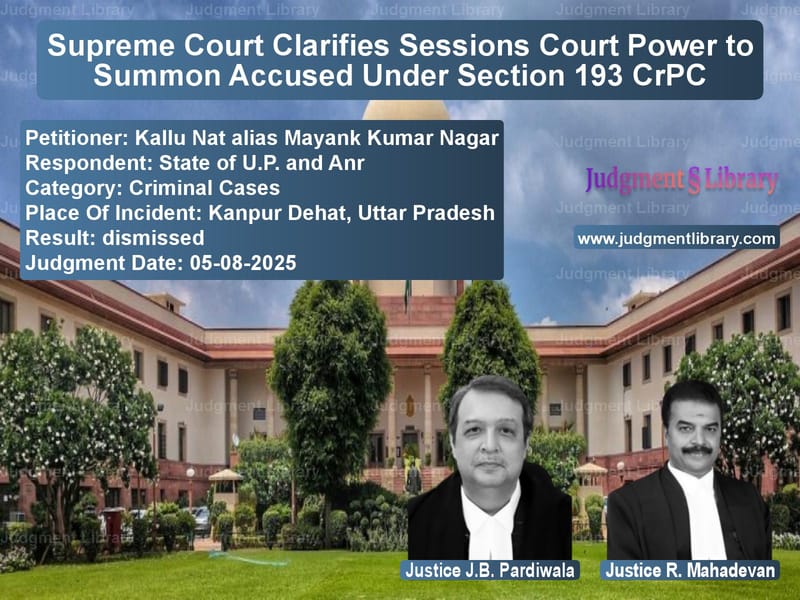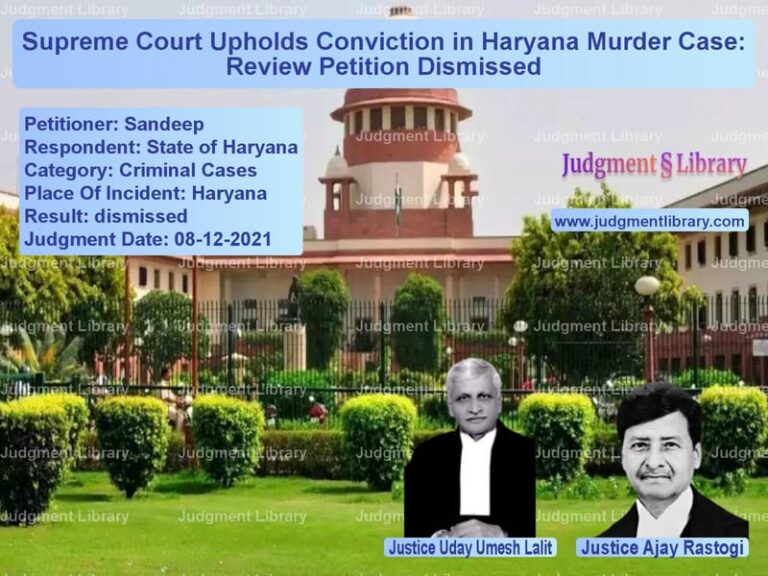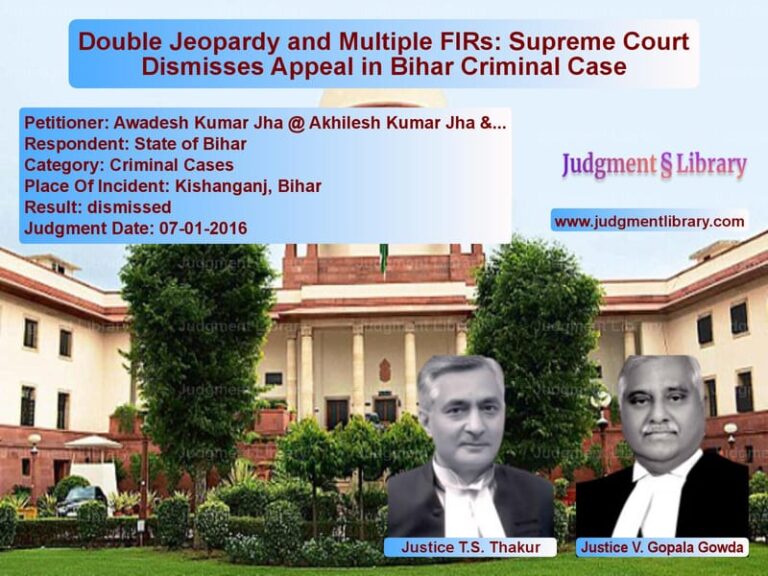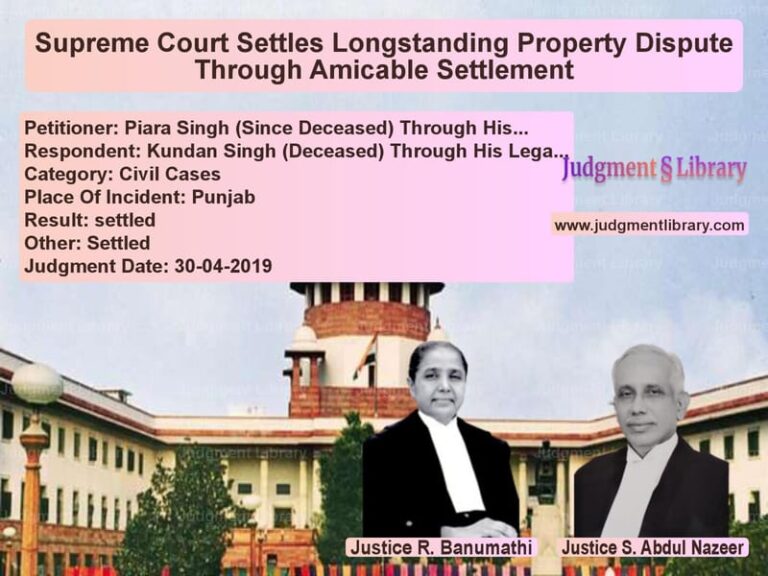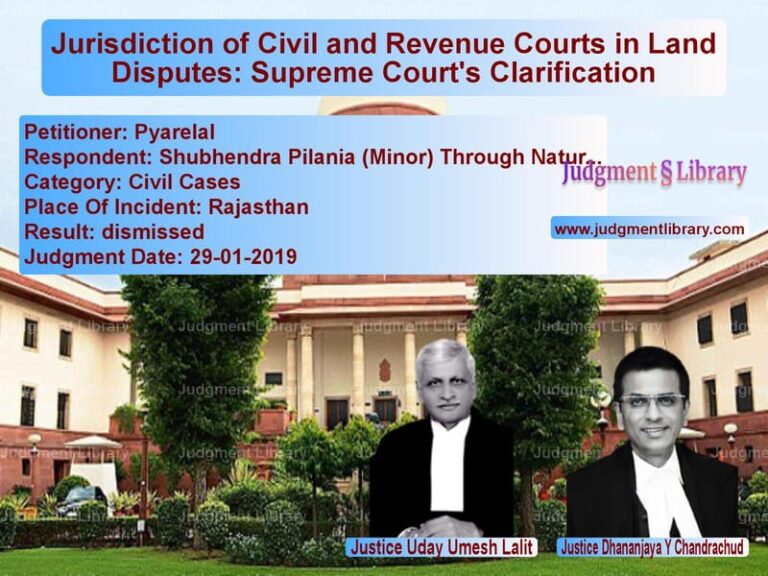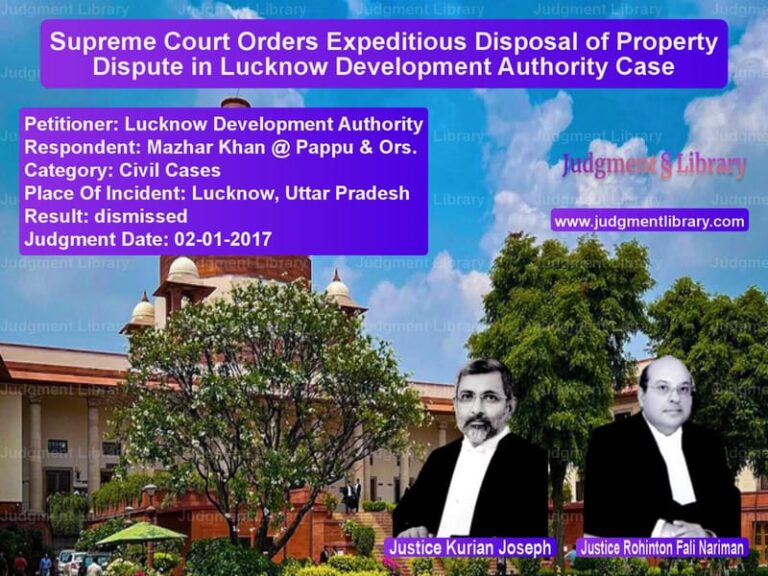Supreme Court Clarifies Sessions Court Power to Summon Accused Under Section 193 CrPC
In a significant judgment that clarifies the powers of Sessions Courts in criminal proceedings, the Supreme Court of India has delivered a comprehensive ruling on when and how a Sessions Court can summon additional accused persons to stand trial. The case involved Kallu Nat alias Mayank Kumar Nagar, who was summoned by the Sessions Court to face trial for rape and murder charges despite not being named in the original charge sheet filed by the police. This legal battle raised fundamental questions about criminal procedure and the powers of courts to ensure that all persons involved in a crime are brought to justice.
The case originated from a tragic incident in November 2018 when Shivwati, a married woman, went missing from her village in Kanpur Dehat, Uttar Pradesh. Her body was discovered three days later in bushes on the outskirts of the village, with a noose tied around her neck. The initial First Information Report (FIR) named only one suspect, Ajay, who was alleged to have had an extra-marital relationship with the deceased. However, during the investigation, evidence emerged suggesting the involvement of Kallu Nat as well.
The Petitioner’s Arguments
Mr. Vikas Upadhyay, the learned counsel appearing for the petitioner vehemently submitted that the trial court as well as the High Court committed a serious error in summoning the petitioner as an accused to face the trial along with the charge sheeted accused, namely, Ajay Kumar. He would submit that the petitioner could have been summoned as an accused to face the trial only after the trial court would have started recording oral evidence of the witnesses. In other words, according to the learned counsel it is only if the involvement of the petitioner would have surfaced from the oral evidence of any of the witnesses, then the trial court would have been justified to summon the petitioner to face the trial in exercise of the powers under Section 319 of the CrPC.
The learned counsel vehemently submitted that there was no scope for the trial court to summon the petitioner in exercise of the powers under Section 193 of the CrPC as the Magistrate while committing the case to the Court of Session had already taken cognizance of the offence and in such circumstances the trial court by invoking Section 193 of the CrPC could not have taken cognizance for the second time. He would submit that the power under Section 193 CrPC is a stage specific power and in the exact words of the learned counsel; once that stage has crossed it gets exhausted unlike the power under Section 319 of the CrPC which could be exercised multiple times during a particular period when the trial is on and is not bound by any specific stage of trial.
Relying on the decision of this Court in Balveer Singh & Anr. vs. State of Rajasthan reported in (2016) 6 SCC 680 he would submit that there is nothing like second cognizance. According to him if a Magistrate has taken cognizance in a case before committing the case, then despite there being power under Section 193 of the CrPC the Sessions court cannot again take cognizance. The learned counsel relying on the Constitution Bench decision in the case of Dharam Pal (supra) would submit that cognizance of offence can be taken only once i.e. either by the Magistrate or by the Sessions court. According to the learned counsel there is nothing like ‘part-cognizance’.
The Supreme Court’s Analysis
The Supreme Court bench comprising Justices J.B. Pardiwala and R. Mahadevan delivered a comprehensive judgment analyzing the intricate provisions of the Code of Criminal Procedure. The court made several crucial observations about the nature of cognizance and the powers of Sessions Courts.
The court explained the fundamental concept of cognizance: “Cognizance is, at its heart, always an act of the court. It entails not merely the receipt of information or the mechanical act of acknowledgement of a particular offence by a judicial authority, but a conscious application of mind by it, to the information disclosed or received, as the case may be, and the subjective element of its satisfaction that i) an offence has indeed occurred and ii) the circumstances necessitate setting into motion criminal proceedings in respect of the said offence, or at the very least take steps for ascertaining if there is any basis for initiating such proceedings. Cognizance is attended by the assumption of jurisdiction for proceeding further.”
The court emphasized that “cognizance is of an offence and not the offender.” This distinction proved crucial in the court’s reasoning. The bench explained that “when a case is committed to the Court of Session, the Court of Session takes cognizance of the case or the offence as a whole and, therefore, is entitled to summon anyone who, on the material before it, appears to be guilty of such offence to stand trial before it. To highlight, what is committed to the Court of Session by the Magistrate is the case or the offence for trial and not the individual offender therefor.”
Interpretation of Section 193 CrPC
The court provided a detailed analysis of Section 193 of the CrPC, which states: “Except as otherwise expressly provided by this Code or by any other law for the time being in force, no Court of Session shall take cognizance of any offence as a Court of original jurisdiction unless the case has been committed to it by a Magistrate under this Code.”
The bench observed that “The expression ‘as a Court of original jurisdiction’ cannot be construed to mean that merely because the Court of Session is precluded from taking cognizance of an offence as forum of inception of proceedings under the Code i.e., as an original forum, that it must by necessary implication, be presumed to be empowered to take cognizance of an offence as a forum of superior jurisdiction or as an intermediate procedural forum at a subsequent stage in the proceedings already initiated.”
The court highlighted the significant change brought about by the 1973 Code: “From the above, the meaningful and significant change brought about in the Code of 1973 seems manifest. In the earlier provision, the requirement was that the accused must have been committed to the Court of Session by a Magistrate. The legislature made a change by deleting the word ‘accused’ and provided instead that the ‘case’ should have been committed to the Court of Session.”
Clarifying Dharam Pal Judgment
The court provided crucial clarification on the Constitution Bench decision in Dharam Pal vs. State of Haryana, which had observed that “cognizance of an offence can only be taken once.” The bench explained that “The aforesaid observations made by the Constitution Bench of this Court in Dharam Pal (supra) should be understood to mean that when the investigating officer files charge sheet for the offence exclusively triable by the Court of Session, then the Magistrate has to look into the charge sheet and prima facie ascertain from the materials on record whether the case is one exclusively triable by the Court of Session.”
The court further elaborated: “Once the case is committed to the Court of Session and the Court of Session finds from the materials on record that a particular individual, though not charge sheeted, is also prima facie involved in the alleged crime, then the Court of Session has the power to take cognizance of the offence for the purpose of summoning that person not named as offender to face the trial.”
Fundamental Principles of Criminal Jurisprudence
The judgment reinforced several fundamental principles of criminal law. The court quoted from the landmark case of Raghubans Dubey vs. State of Bihar: “In our opinion once cognizance has been taken by the Magistrate, he takes cognizance of an offence and not the offenders; once he takes cognizance of an offence it is his duty to find out who the offenders really are and once he comes to the conclusion that apart from the persons sent up by the police some other persons are involved, it is his duty to proceed against those persons. The summoning of the additional accused is part of the proceeding initiated by his taking cognizance of an offence.”
The bench also cited the powerful language from A.R. Antulay v. Ramdas Srinivas Nayak: “Punishment of the offender in the interest of the society being one of the objects behind penal statutes, enacted for larger good of the society, right to initiate proceedings cannot be whittled down, circumscribed or fettered by putting it into a straight-jacket formula of locus standi unknown to criminal jurisprudence, save and except specific statutory exception.”
Court’s Conclusion and Directions
In its final conclusion, the Supreme Court summarized the legal position: “Both under Sections 209 and 193 respectively of the Code 1973 commitment is of, the ‘case’ and not of the ‘accused’ as distinguished from Section193(3) and Section 207A respectively of the old Code where commitment was of the ‘accused’ and not the ‘case’. For committing a case there must be an offence and involvement of a person who committed the same. Even though the case is committed yet cognizance taken is of the offence and not the offender.”
The court emphasized that “Once the Court takes cognizance of the offence (not of the offender), it becomes the Court’s duty to find out the real offenders and if it comes to the conclusion that besides the persons put up for trial by the police some others are also involved in the commission of the crime, it is the Court’s duty to summon them to stand trial along with those already named, since summoning them would only be part of the process of taking cognizance.”
The Supreme Court dismissed the petition and directed that “The trial court shall now proceed to frame charge if not yet framed and start recording with the oral evidence of the witnesses. The trial shall be completed within a period of six months from the date of the receipt of the writ of this order.”
This judgment provides crucial clarity on the powers of Sessions Courts to ensure that all persons involved in criminal activities are brought to justice, regardless of whether they were initially named in the police charge sheet. The ruling reinforces that the primary duty of courts is to uncover the truth and ensure that justice is served, and procedural technicalities should not become obstacles in this fundamental pursuit.
Petitioner Name: Kallu Nat alias Mayank Kumar Nagar.Respondent Name: State of U.P. and Anr.Judgment By: Justice J.B. Pardiwala, Justice R. Mahadevan.Place Of Incident: Kanpur Dehat, Uttar Pradesh.Judgment Date: 05-08-2025.Result: dismissed.
Don’t miss out on the full details! Download the complete judgment in PDF format below and gain valuable insights instantly!
Download Judgment: kallu-nat-alias-maya-vs-state-of-u.p.-and-an-supreme-court-of-india-judgment-dated-05-08-2025.pdf
Directly Download Judgment: Directly download this Judgment
See all petitions in Murder Cases
See all petitions in Rape Cases
See all petitions in Bail and Anticipatory Bail
See all petitions in Fraud and Forgery
See all petitions in Attempt to Murder Cases
See all petitions in Judgment by J.B. Pardiwala
See all petitions in Judgment by R. Mahadevan
See all petitions in dismissed
See all petitions in supreme court of India judgments August 2025
See all petitions in 2025 judgments
See all posts in Criminal Cases Category
See all allowed petitions in Criminal Cases Category
See all Dismissed petitions in Criminal Cases Category
See all partially allowed petitions in Criminal Cases Category

